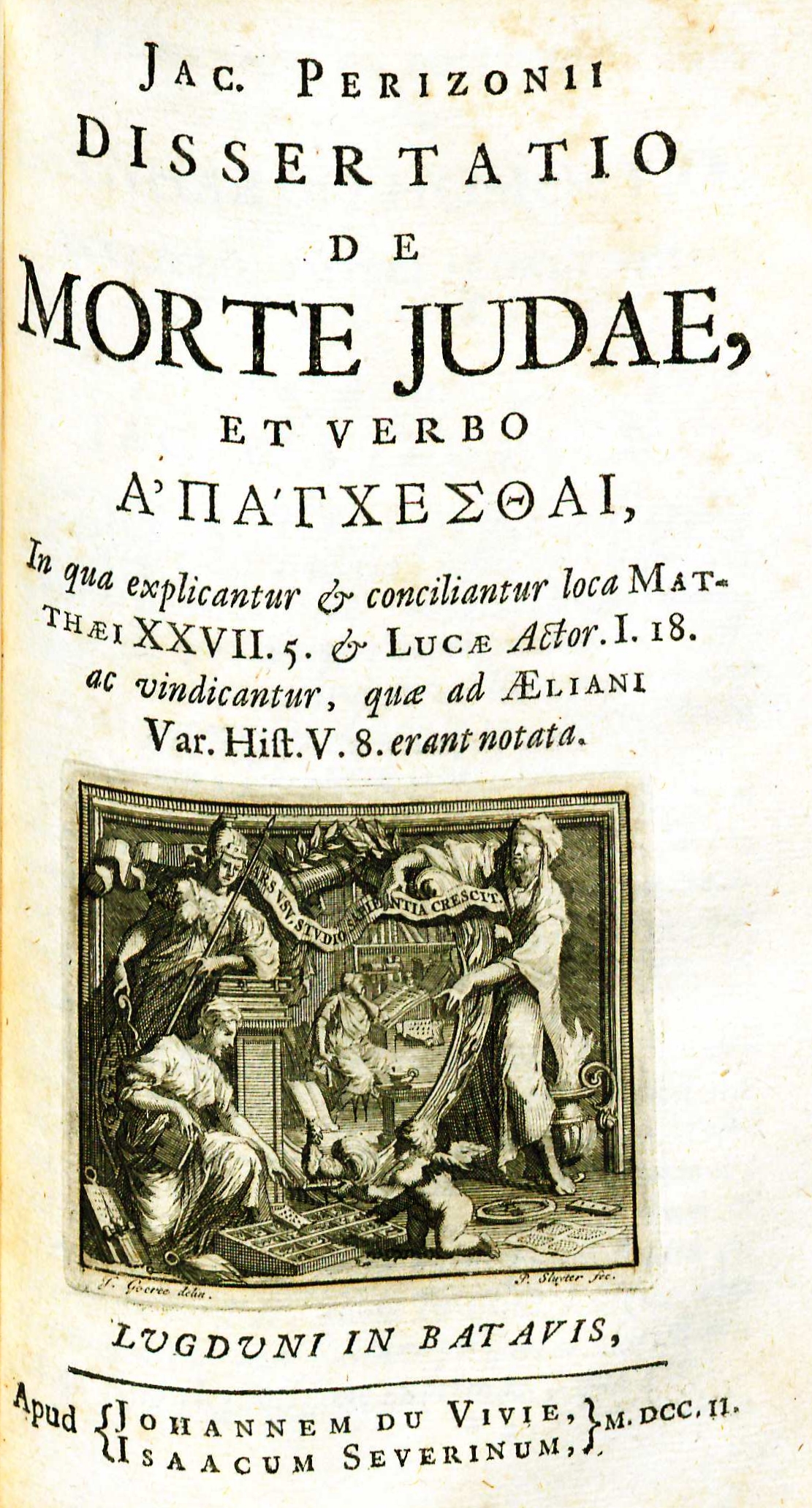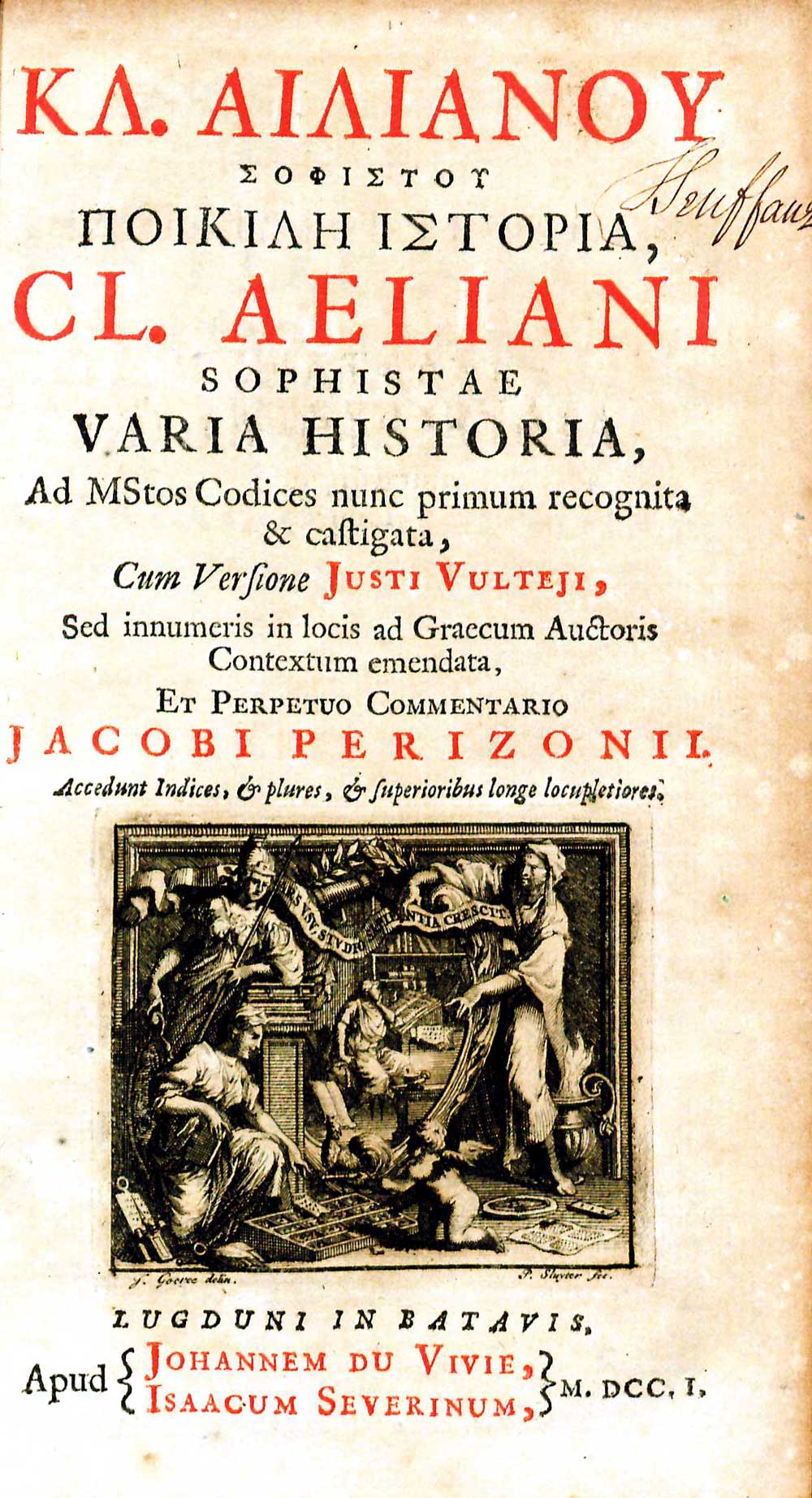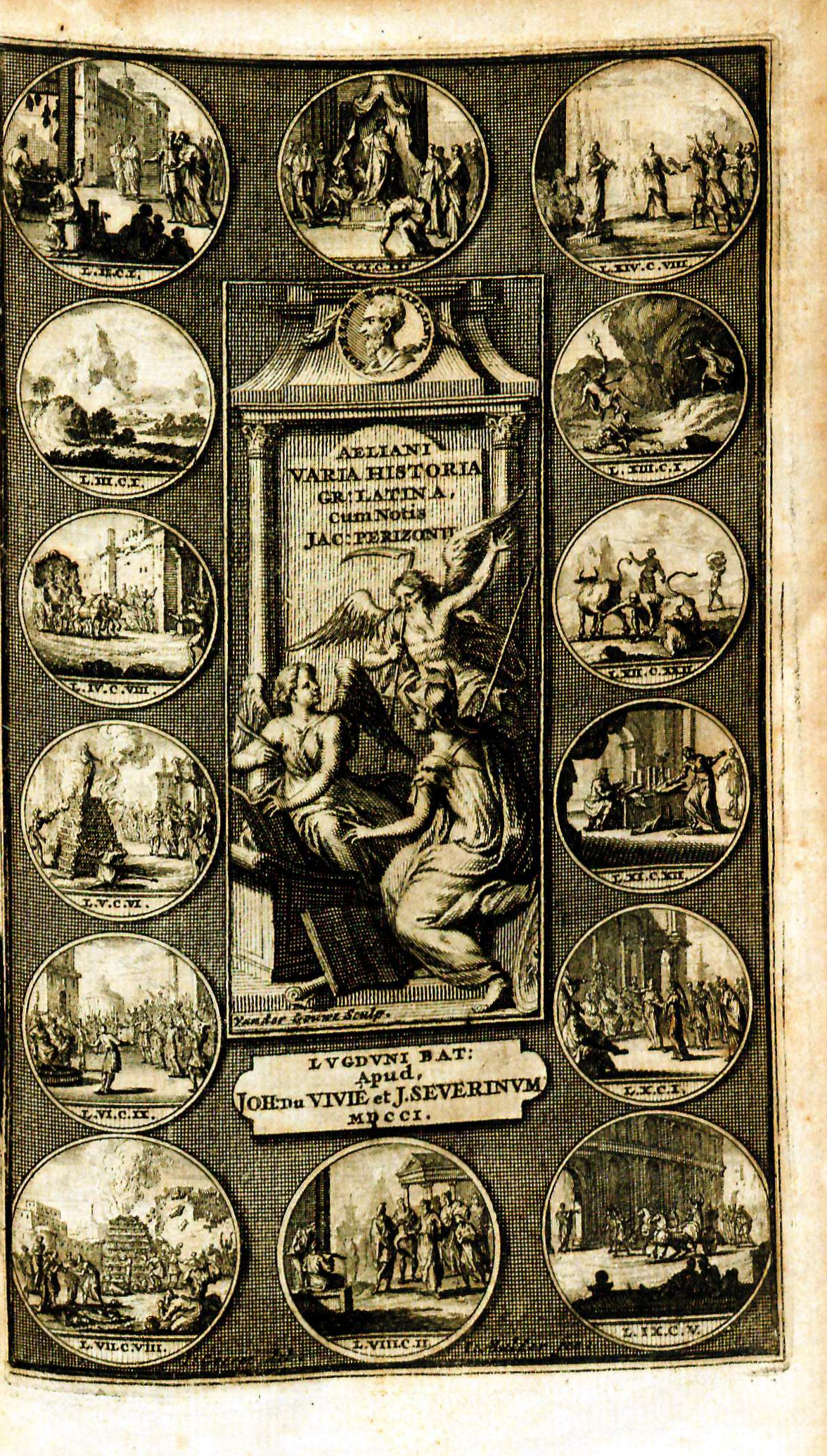Difference between revisions of "Kl. Ailianou Sophistou Poikilē Historia"
| Line 15: | Line 15: | ||
|set=3 | |set=3 | ||
|desc=8vo (21 cm.) | |desc=8vo (21 cm.) | ||
| + | |shelf=H-2 | ||
}}[[File:AelianKlAilianouSophistouPoikileHistoria1701v1HalfTitle.jpg|left|thumb|200px|<center>Half-title.</center>]][http://en.wikipedia.org/wiki/Claudius_Aelianus Aelian] lived in the 2nd and 3rd centuries CE (roughly 165-230 CE). He was a freedman born in a hillside town near Rome who learned Greek from a [http://en.wikipedia.org/wiki/Sophist sophist].<ref>"[http://www.oxfordreference.com/view/10.1093/acref/9780192801463.001.0001/acref-9780192801463-e-35 Aelian]" in ''Oxford Dictionary of the Classical World'', ed. John Roberts (Oxford: Oxford University Press, 2007).</ref> Aelian became a sophist himself – a title which originally indicated that a person had a particular skill and therefore wisdom, but came to refer to a personal teacher who traveled from town to town preparing men from wealthy families for public success.<ref>"[http://www.oxfordreference.com/view/10.1093/acref/9780199548545.001.0001/acref-9780199548545-e-2770 Sophist]" in ''The Oxford Companion to Classical Literature'', ed. M.C. Howatson (Oxford: Oxford University Press, 2011).</ref><br /> | }}[[File:AelianKlAilianouSophistouPoikileHistoria1701v1HalfTitle.jpg|left|thumb|200px|<center>Half-title.</center>]][http://en.wikipedia.org/wiki/Claudius_Aelianus Aelian] lived in the 2nd and 3rd centuries CE (roughly 165-230 CE). He was a freedman born in a hillside town near Rome who learned Greek from a [http://en.wikipedia.org/wiki/Sophist sophist].<ref>"[http://www.oxfordreference.com/view/10.1093/acref/9780192801463.001.0001/acref-9780192801463-e-35 Aelian]" in ''Oxford Dictionary of the Classical World'', ed. John Roberts (Oxford: Oxford University Press, 2007).</ref> Aelian became a sophist himself – a title which originally indicated that a person had a particular skill and therefore wisdom, but came to refer to a personal teacher who traveled from town to town preparing men from wealthy families for public success.<ref>"[http://www.oxfordreference.com/view/10.1093/acref/9780199548545.001.0001/acref-9780199548545-e-2770 Sophist]" in ''The Oxford Companion to Classical Literature'', ed. M.C. Howatson (Oxford: Oxford University Press, 2011).</ref><br /> | ||
<br /> | <br /> | ||
| Line 27: | Line 28: | ||
View the record for this book in [https://catalog.swem.wm.edu/law/Record/3669677 William & Mary's online catalog.] | View the record for this book in [https://catalog.swem.wm.edu/law/Record/3669677 William & Mary's online catalog.] | ||
| + | |||
| + | ==See also== | ||
| + | *[[George Wythe Room]] | ||
| + | *[[Wythe's Library]] | ||
| + | |||
==References== | ==References== | ||
<references/> | <references/> | ||
Revision as of 08:06, 6 July 2015
by Aelian
| Kl. Ailianou Sophistou Poikilē Historia | |
|
Title page from Kl. Ailianou Sophistou Poikilē Historia, George Wythe Collection, Wolf Law Library, College of William & Mary. | |
| Author | Aelian |
| Editor | Jacobus Perizonius |
| Translator | Justus Vultejus |
| Published | Lugduni in Batavis: Apud Johannem du Vivie, Isaacum Severinum |
| Date | 1701 |
| Language | Greek and Latin in parallel columns |
| Volumes | 3 volume set |
| Desc. | 8vo (21 cm.) |
| Location | Shelf H-2 |
Aelian’s Varia Historia, or Miscellaneous Historical, is a collection of various stories and anecdotes.[3] Even in modern times, Aelian’s work and details are viewed with skepticism. One classicist went so far as to say "Aelian’s aim is to supply well-turned exempla, and he seems to have relied uncritically upon whatever summary he found." [4] Despite reservations about his choice of content, Aelian was widely respected for his simple, clear writing and use of pure Attic language.[5]
Evidence for Inclusion in Wythe's Library
Listed in the Jefferson Inventory of Wythe's Library as "Aelianus Perizonii 2.v. 8vo." This was one of the titles kept by Thomas Jefferson and may have been sold to the Library of Congress in 1815. Jefferson did sell a copy of the 1701 Leiden edition of Kl. Ailianou Sophistou Poikilē Historia to the Library of Congress, and that copy still exists today. However, the set has no definitive markings linking it to Wythe.[6] George Wythe's Library[7] on LibraryThing includes the copy at the Library of Congress. The Brown Bibliography[8] discusses the Library of Congress copy, noting "it does correspond to the description in Wythe's inventory better than other possible editions owned by Jefferson." The Wolf Law Library followed the recommendations of Brown and LibraryThing and purchased the 1701 Leiden edition.

Description of the Wolf Law Library's copy
Three volumes bound in late eighteenth century full calf with raised bands. Spine in six panels and morocco title label to second panel, contrasting morocco volume label to third, remaining panels with gilt central lozenge and volute corner pieces. Has gilt rolled border to covers with all edges marbled and blue paste endpapers. Contains previous owner's name on title page of volume one and first page of text of volumes two and three. Volume three bound with two Jacobus Perizonius works: Jac. Perizonii Dissertatio de Morte Judae et Verbo Apanchesthai (1702) and Jac. Perizonii Responsio ad Nuperam Notitiam de Variis Aeliani, Aliorumque Auctorum, Locis (1703). Purchased from Temple Rare Books.
View the record for this book in William & Mary's online catalog.
See also
References
- ↑ "Aelian" in Oxford Dictionary of the Classical World, ed. John Roberts (Oxford: Oxford University Press, 2007).
- ↑ "Sophist" in The Oxford Companion to Classical Literature, ed. M.C. Howatson (Oxford: Oxford University Press, 2011).
- ↑ Mervin R. Dilts, “The Manuscript Tradition of Aelian’s Varia Historia and Heraclides’ Politiae,” Transactions and Proceedings of the American Philological Association 96 (1965): 57.
- ↑ Edwin Carawan, "Pericles the Younger and the Citizenship Law," The Classical Journal 103, no. 4 (Apr.- May, 2008): 383-406.
- ↑ "Aelian" in Oxford Dictionary of the Classical World.
- ↑ E. Millicent Sowerby, Catalogue of the Library of Thomas Jefferson, 2nd ed. (Charlottesville: University Press of Virginia, 1983), 1:48-49 [no.103].
- ↑ LibraryThing, s.v. "Member: George Wythe," accessed on March 5, 2014.
- ↑ Bennie Brown, "The Library of George Wythe of Williamsburg and Richmond," (unpublished manuscript, May, 2012) Microsoft Word file. Earlier edition available at: https://digitalarchive.wm.edu/handle/10288/13433.

